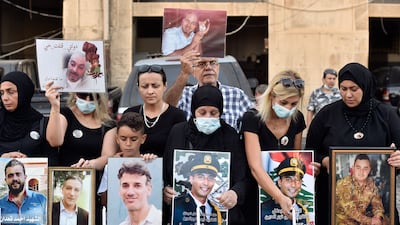Family members of victims of the Beirut port blast blocked one of the port’s entrances on Monday in a bid to pressurise politicians to submit to questioning about their role in the explosion.
Dozens gathered at an entrance used by lorries in the early hours of the morning, calling on those summoned by investigative judge Tarek Bitar to appear before him.
“We will not let them play with our case. They played us enough,” Ibrahim Hoteit, a representative of the victims’ families told the small crowd through a loudspeaker.
“We want them to appear before the investigative judge. We want the truth and justice,” Mr Hoteit told The National, only hours before Mr Bitar questioned former Lebanese Army commander Jean Kahwaji.
Mr Hoteit ended the protest at 10am, once Mr Kahwaji's presence in Mr Bitar's office was confirmed, but families want to maintain pressure on politicians.
Two leading officials who have evaded questioning in the past, former prime minister Hassan Diab and former public works minister Youssef Fenianos, are scheduled for hearings on Thursday and Monday.
"There is no excuse to evade the law," Mr Hoteit said.
Mr Kahwaji was commander of the Lebanese Army in 2013 when 2,750 tonnes of ammonium nitrate entered the port. Lebanese law states that the army is the only institution legally allowed to remove and destroy ammonium nitrate, commonly used as a fertiliser.
The chemicals lay stored unsafely in a port warehouse for about seven years, then blew up on August 4, 2020, killing at least 214 people, injuring thousands and destroying much of the capital city. Mr Kahwaji’s lawyer, who was present during his interrogation on Monday, was not available for comment.
Legal documents show that bodies, including the army, State Security and General Security, as well as leading politicians, were aware of the danger posed by the chemicals. So far, they have all deflected blame.
Monday's session was Mr Kahwaji's first summons by Mr Bitar. The judge's predecessor, Fadi Sawan, questioned Mr Kahwaji as a witness in February, days before the latter was removed after a court granted the request of two of the former ministers he had charged with negligence over the disaster.
Mr Bitar has faced stiff resistance from Lebanon’s political class as he tries to lift their immunity and move the investigation forward. Some politicians have tried to push for a parliamentary probe, much to the dismay of families of victims who believe such a move will only protect the legislature.
Lebanon and Bahrain Human Rights Watch researcher
Those in pretrial detention are mostly mid-ranking officials who are largely unknown to the general public. Recent arrests include Higher Customs’ Council member Hani Haj Chehadeh and former port operations director Sami El Hussein, local media reported.
But victims' families want to see all suspects treated equally.
“We know some small employees made mistakes but there were officials above them and we’re aiming for the big fish,” said William Noun, whose brother Joe Noun, a firefighter, died in the explosion. “All politicians are against [Mr Bitar] and against us,” he told The National, after speaking at Monday's protest.
In late August, Mr Diab snubbed a summons to appear before Mr Bitar for questioning, prompting the judge to issue a subpoena. Judicial sources told Reuters the judge would have the right to issue an arrest warrant should this happen again.
At the time, several former prime ministers, including current head of government Najib Mikati, expressed support for Mr Diab, with Mr Mikati labelling the subpoena an “insult” and an attack on the premiership, a job allocated to a Sunni Muslim under Lebanon’s sectarian power-sharing system. Mr Diab’s press office declined to comment on Monday.
Such moves have come under fire from human rights activists and law experts.
“Judge Bitar has charged and called in for questioning Mr Diab, Mr Fenianos and Mr Kahwaji, based on evidence that he has implicating them in relation to the Beirut blast,” said Aya Majzoub, Lebanon and Bahrain researcher for Human Rights Watch.
“They are repeatedly undermining, blocking and delaying the investigation by refusing to show up to their questioning sessions.”


